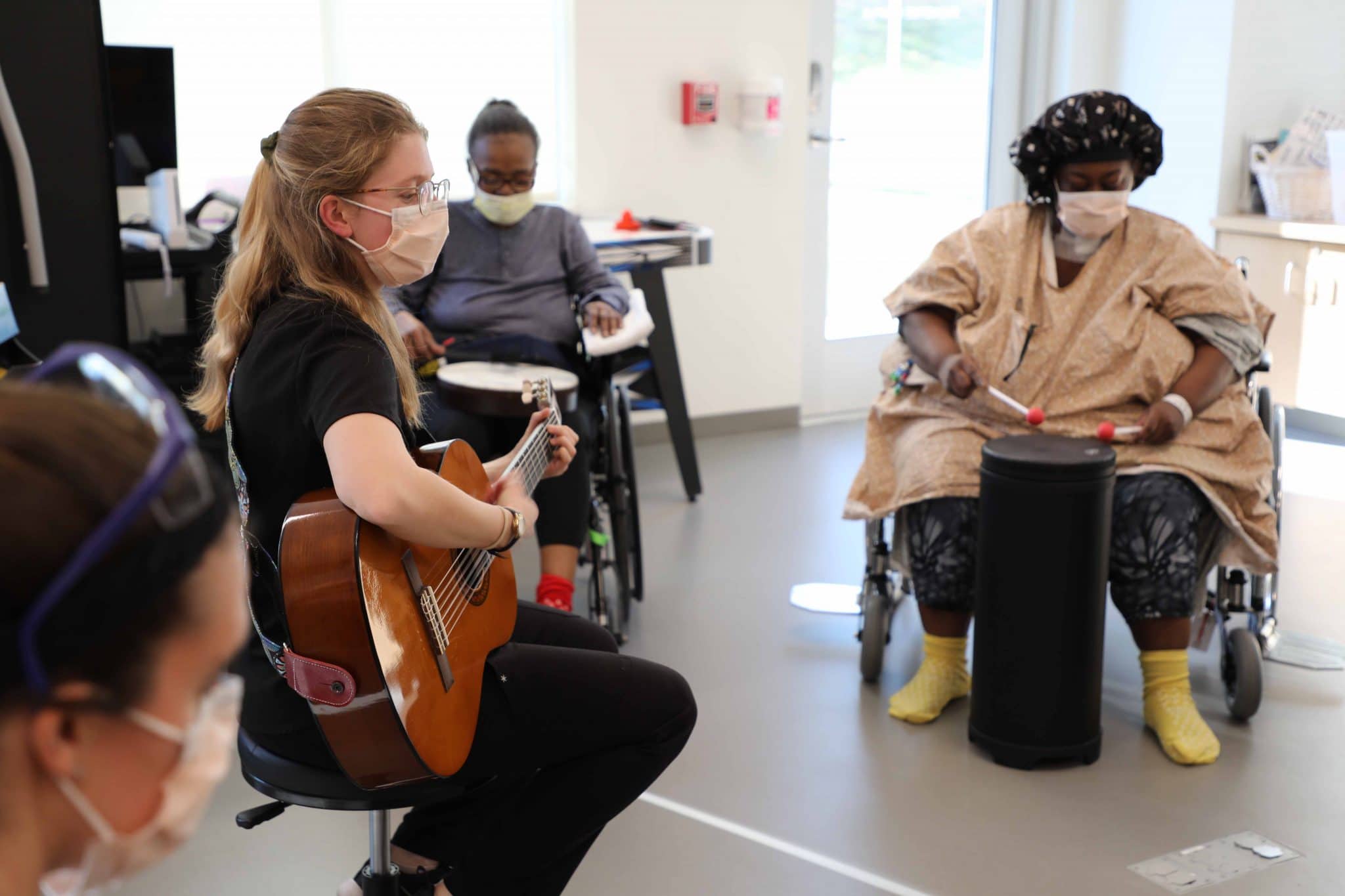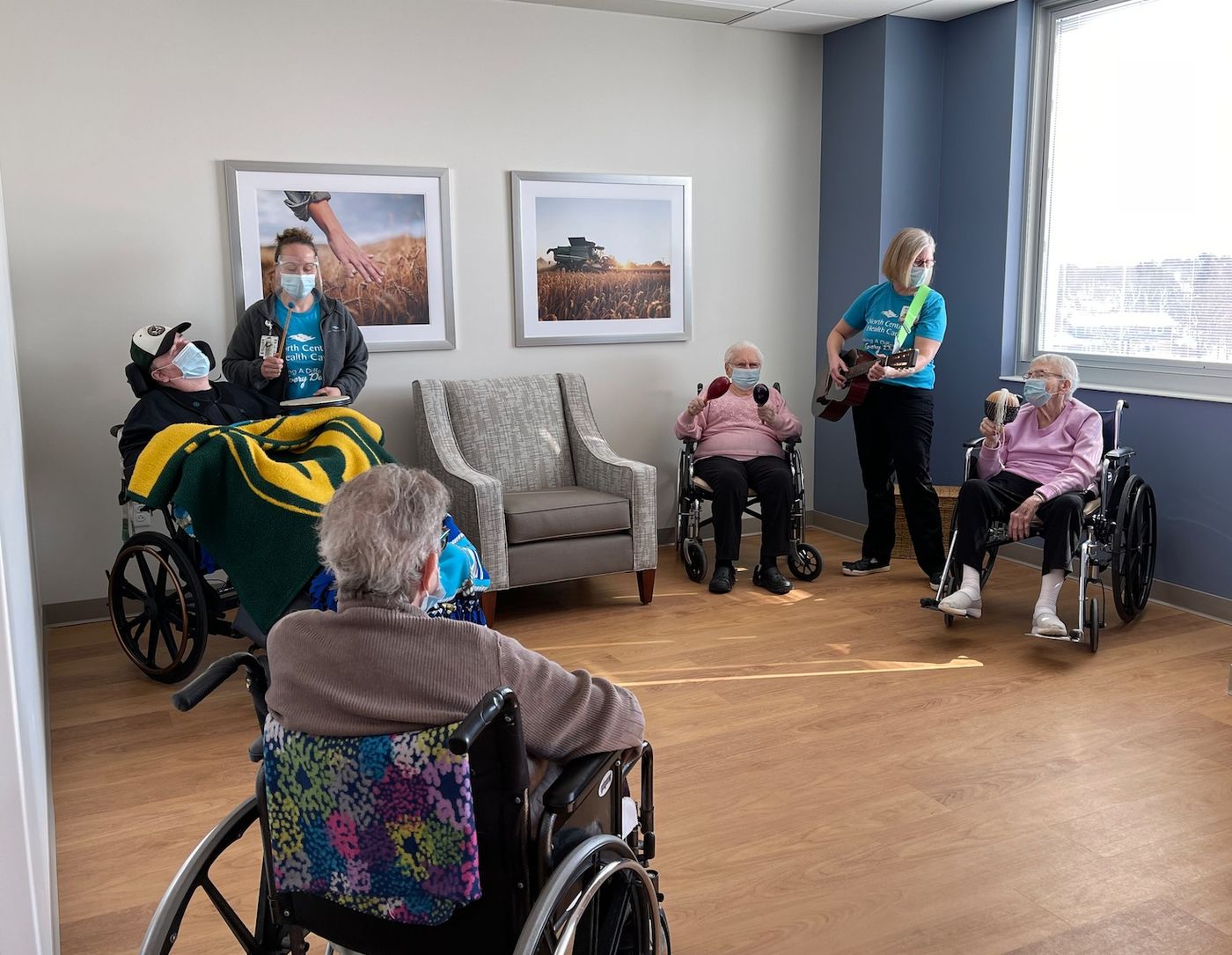Home>Events & Info>Music Therapy>Which Is Music Therapy Important For Cancer Patients


Music Therapy
Which Is Music Therapy Important For Cancer Patients
Published: February 1, 2024
Discover the benefits of using music therapy for cancer patients. Learn how music can help reduce stress, manage pain, and improve overall well-being during treatment.
(Many of the links in this article redirect to a specific reviewed product. Your purchase of these products through affiliate links helps to generate commission for AudioLover.com, at no extra cost. Learn more)
Table of Contents
- Introduction
- Understanding Music Therapy
- Benefits of Music Therapy for Cancer Patients
- Reducing Anxiety and Stress
- Managing Pain and Discomfort
- Improving Mood and Emotional Well-being
- Enhancing Quality of Life
- Boosting Immune System and Overall Health
- Incorporating Music Therapy into Cancer Treatment
- Considerations and Limitations of Music Therapy for Cancer Patients
- Conclusion
Introduction
Music has always had a profound impact on human emotions and well-being. It can evoke powerful emotions, bring comfort in times of sorrow, and uplift our spirits. But did you know that music can also play a therapeutic role in improving the physical and mental health of individuals? This is where music therapy comes into play.
Music therapy is a specialized field that harnesses the power of music to address various physical, emotional, and psychological needs of individuals. It is a holistic approach that integrates music-based techniques and interventions into therapeutic settings to enhance the healing process.
For individuals battling cancer, music therapy can offer a multitude of benefits. Cancer treatment can take a toll on patients physically, emotionally, and mentally. Music therapy provides a non-invasive and complementary approach to conventional treatments, helping to alleviate some of the side effects and improve overall well-being.
In this article, we will explore the significance of music therapy for cancer patients. We will delve into the benefits it offers, the ways it can be incorporated into cancer treatment, and its limitations. So, let’s dive in and see why music therapy is a crucial component of cancer care.
Understanding Music Therapy
Music therapy is a field that utilizes the power of music to enhance the physical, emotional, and mental well-being of individuals. It is conducted by trained professionals known as music therapists, who possess a deep understanding of how music can be used as a therapeutic tool.
The therapy sessions are tailored to meet the specific needs of each individual, taking into consideration their unique circumstances and goals. Music therapists may use a variety of techniques, such as playing instruments, singing, songwriting, guided imagery, and music-assisted relaxation, to engage patients in the therapeutic process.
One of the fundamental principles of music therapy is the belief that music has a universal appeal and can transcend cultural, linguistic, and cognitive barriers. It can communicate emotions and experiences that may be difficult to express in words, allowing individuals to explore and process their feelings in a safe and supportive environment.
Music therapy is a evidence-based practice, backed by a growing body of research that demonstrates its effectiveness in various healthcare settings. It has been shown to reduce anxiety and stress, manage pain, improve mood and emotional well-being, enhance cognitive function, and promote overall quality of life.
It is important to note that music therapy is not the same as simply listening to music for relaxation or enjoyment. While these activities can have their own therapeutic value, music therapy involves a structured and intentional use of music to achieve specific therapeutic goals. It requires the expertise of a trained music therapist who can effectively utilize music as a tool for healing and transformation.
Now that we have a basic understanding of music therapy, let’s explore how it can benefit cancer patients in their journey towards recovery and well-being.
Benefits of Music Therapy for Cancer Patients
Music therapy can offer a wide range of benefits for individuals battling cancer. It can serve as a powerful tool to address the physical, emotional, and psychological challenges that accompany the disease and its treatment. Let’s explore some of the key benefits:
Reducing Anxiety and Stress:
Cancer diagnosis and treatment can be overwhelming, leading to increased levels of anxiety and stress. Music therapy provides a soothing and comforting experience, helping to alleviate these negative emotions. Through the use of calming music, relaxation techniques, and breathing exercises, music therapy can promote a sense of calmness, reduce tension, and support emotional well-being.
Managing Pain and Discomfort:
Studies have shown that music therapy can be effective in reducing pain and discomfort in cancer patients. Music has the ability to distract individuals from their pain, promote relaxation, and release endorphins, which are natural pain-relieving chemicals in the body. Whether through live music performances, personalized playlists, or guided imagery exercises, music therapy can provide a complementary approach to pain management.
Improving Mood and Emotional Well-being:
Dealing with cancer can take an emotional toll on patients, leading to feelings of sadness, depression, and isolation. Music therapy can uplift spirits, improve mood, and foster emotional well-being. It can stimulate positive emotions, evoke memories, and provide a sense of connection and comfort. By working closely with a music therapist, patients can explore and express their emotions through music, providing a cathartic and empowering experience.
Enhancing Quality of Life:
Music therapy can significantly enhance the overall quality of life for cancer patients. It can provide a source of joy and pleasure, improve social interaction and communication, and promote a sense of empowerment and control. By engaging in musical activities and creative expression, patients can regain a sense of purpose and regain a sense of normalcy in their lives.
Boosting Immune System and Overall Health:
Research suggests that music therapy may have a positive impact on the immune system and overall health of cancer patients. Music has been shown to reduce stress hormones, enhance immune function, and improve cardiovascular health. By reducing stress and promoting relaxation, music therapy can support the body’s natural healing processes and boost overall well-being.
These are just a few examples of the benefits that music therapy can offer to cancer patients. Music therapy can be tailored to meet the specific needs and preferences of each individual, providing a personalized and holistic approach to healing and well-being.
Reducing Anxiety and Stress
Anxiety and stress are common experiences for cancer patients, as the diagnosis and treatment process can be emotionally challenging and overwhelming. Music therapy offers a powerful and effective approach to alleviate these negative emotions and promote a sense of calmness and relaxation.
During music therapy sessions, patients are exposed to calming and soothing music that can help shift their focus away from their worries and concerns. The rhythmic patterns, melodic progressions, and harmonies in music have the ability to regulate heart rate, blood pressure, and cortisol levels, promoting a state of relaxation and reducing anxiety.
Music therapy provides a safe and supportive environment for patients to express and process their emotions. Through engaging in musical activities, such as playing instruments, singing, or improvising melodies, patients can release emotional tension and gain a sense of control over their feelings. Music therapy allows individuals to explore and express their emotions in a non-verbal and non-threatening way, which can be particularly beneficial for those who struggle to articulate their experiences through words alone.
One of the unique aspects of music therapy is its ability to evoke powerful emotional responses and memories. Certain songs or melodies can transport individuals back to significant moments in their lives or evoke emotions associated with specific memories. By using personalized playlists or encouraging patients to choose music that resonates with them, music therapists can tap into these emotional connections and stir positive feelings and associations.
Furthermore, music therapy can promote a sense of connection and companionship among cancer patients. Group music therapy sessions provide an opportunity for patients to share their experiences, support one another, and feel a sense of belonging. Engaging in musical activities together can foster social interaction, reduce feelings of isolation, and create a supportive community within the cancer care setting.
Overall, music therapy is a powerful tool for reducing anxiety and stress in cancer patients. By harnessing the therapeutic potential of music, it can provide a calming and comforting experience, facilitate emotional expression and processing, and promote a sense of connection and well-being. Incorporating music therapy into the comprehensive care of cancer patients can contribute to their overall quality of life and enhance their psychological well-being throughout their treatment journey.
Managing Pain and Discomfort
Pain and discomfort are common challenges faced by cancer patients, often resulting from the disease itself or the side effects of treatment. Music therapy has shown promising results in helping to manage and reduce pain, providing patients with a complementary approach to pain management.
When listening to music, the brain releases endorphins, which are natural pain-relieving chemicals that can help reduce the perception of pain. Music can also serve as a distraction, redirecting attention away from sensations of pain and discomfort. By engaging patients in musical activities or guiding them through listening exercises, music therapists can effectively reduce the intensity of pain and improve patients’ overall comfort.
Live music therapy sessions can be particularly impactful for pain management. The presence of a live musician can create a sense of connection and engagement, allowing patients to become immersed in the music and experience a heightened sense of relaxation. The rhythm, melody, and harmonies can effectively promote a sense of calmness and reduce stress, further easing the experience of pain.
Guided imagery is another technique commonly utilized in music therapy for pain management. This technique involves using music to guide patients through imaginary scenes or experiences that are soothing and pleasant. By creating mental images that evoke positive emotions and sensations, patients can shift their focus away from the pain and experience a sense of relief and comfort.
In addition, music therapy can also provide a means for patients to express and process their feelings of pain and discomfort. Through singing, songwriting, or improvisation, patients can find a creative outlet to channel their emotions and gain a sense of control over their pain. This can be empowering and help individuals cope with their pain in a constructive and cathartic way.
Lastly, it is important to note that music therapy complements conventional pain management techniques and does not replace them. It is often used in combination with medication or other pain management interventions to provide a holistic approach to pain relief.
By incorporating music therapy into the care plan of cancer patients, healthcare providers can offer a comprehensive approach to managing pain and discomfort. Through the power of music, patients can find relief, experience a heightened sense of comfort, and regain a sense of control over their well-being.
Improving Mood and Emotional Well-being
Dealing with cancer can take a toll on the emotional well-being of patients, often leading to feelings of sadness, anxiety, and depression. Music therapy offers a unique avenue for improving mood and enhancing emotional well-being by harnessing the power of music to evoke positive emotions and foster a sense of connection and joy.
Music has the ability to stimulate the release of dopamine, a neurotransmitter associated with pleasure and reward. When patients listen to music that they enjoy, it can trigger the brain’s reward system, promoting a sense of happiness and improving their overall mood. By carefully selecting music that resonates with the individual, music therapists can help patients access positive emotions and memories, resulting in an uplifted mood.
Engaging in active music making, such as singing or playing an instrument, can also be an effective way to boost mood and emotional well-being. Making music allows individuals to express themselves creatively and engage in an enjoyable and fulfilling activity. It can provide a sense of accomplishment, increase self-esteem, and serve as a form of self-expression.
Music therapy can also offer a sense of emotional support and validation for cancer patients. During music therapy sessions, patients may share their thoughts, fears, and experiences through musical improvisation, songwriting, or discussion. The music therapist creates a safe and non-judgmental space for patients to express their emotions, providing a sense of comfort and understanding.
Singing or listening to uplifting and empowering songs can create a sense of hope and resilience. Music therapy can infuse a renewed sense of purpose, motivation, and optimism, enabling patients to navigate the challenges of cancer with a positive outlook. It can also provide an outlet for emotional release and catharsis, allowing patients to process their emotions and find solace in the music.
Additionally, group music therapy sessions can foster social interaction and create a sense of camaraderie among cancer patients. Engaging in musical activities together, such as singing in a choir or participating in drum circles, can provide a supportive community and a shared sense of belonging. The sense of connection and support from fellow patients can be invaluable in promoting emotional well-being and reducing feelings of isolation.
By incorporating music therapy into the comprehensive care of cancer patients, healthcare providers can help improve their mood and emotional well-being. Through the power of music, patients can experience a range of positive emotions, find comfort and support, and regain a sense of joy and hope amidst their cancer journey.
Enhancing Quality of Life
A cancer diagnosis can have a significant impact on a person’s overall quality of life. It can disrupt daily routines, relationships, and social connections, leaving individuals feeling isolated or disconnected. Music therapy has the potential to improve the quality of life for cancer patients by providing a source of joy, empowerment, and connection.
Engaging in music therapy activities can bring moments of pleasure and enjoyment to patients’ lives. The experience of listening to music or actively participating in musical activities can be a source of comfort and relief from the challenges of cancer treatment. Whether it’s through exploring favorite songs or creating new musical compositions, music therapy can provide a sense of purpose and fulfillment.
Music therapy sessions can also serve as a platform for individuals to express themselves creatively and engage in a meaningful outlet. This can empower patients to regain a sense of control over their lives and find a renewed sense of purpose. Creating music, writing lyrics, or even engaging in movement to music can allow patients to tap into their inner resources and explore their identities beyond the cancer diagnosis.
Music therapy offers an opportunity for social interaction and connection between cancer patients. Group music therapy sessions provide a supportive community where individuals can share their experiences, emotions, and challenges, fostering a sense of belonging and understanding. Collaborative music-making activities, such as singing in a choir or playing instruments together, strengthen social bonds and create a sense of camaraderie.
Music also has the power to unlock memories and evoke emotions associated with significant life events. This can be particularly meaningful for cancer patients, as it allows them to reconnect with positive memories and experiences. By creating personalized playlists or incorporating familiar songs into therapy sessions, music therapists can help patients reminisce and find solace in the power of music.
Furthermore, music therapy can provide a respite from the daily stresses and worries that cancer patients may face. It offers a moment of escape and distraction from the physical and emotional challenges of treatment. Through engaging in music therapy, patients can experience moments of relaxation, peace, and respite, promoting overall well-being.
By integrating music therapy into the comprehensive care of cancer patients, healthcare providers can help enhance their quality of life. Through the healing power of music, patients can experience joy, empowerment, connection, and a renewed sense of purpose, making their cancer journey more meaningful and fulfilling.
Boosting Immune System and Overall Health
The immune system plays a critical role in fighting cancer and maintaining overall health. Music therapy has been shown to have a positive impact on the immune system, thereby contributing to the well-being and overall health of cancer patients.
Stress and anxiety can often compromise the immune system’s ability to function optimally. Music therapy helps to alleviate stress and promote relaxation, which in turn can strengthen the immune response. Listening to calming music or participating in music-making activities has been shown to reduce the production of stress hormones such as cortisol, thus supporting a healthier immune system.
Research has also suggested that music therapy can help regulate heart rate, blood pressure, and respiratory rates. By promoting a state of relaxation, music therapy can help reduce physical tension and promote overall cardiovascular health. A healthier cardiovascular system supports the delivery of oxygen and nutrients to tissues and organs, which is crucial for optimal immune function.
The power of music to stimulate the release of endorphins, our body’s natural painkillers, can also have an indirect positive impact on the immune system. When patients experience less pain and discomfort through music therapy, their overall well-being improves, leading to a stronger immune system and better overall health.
Music therapy has also been shown to improve sleep quality and enhance overall sleep patterns. Adequate and restful sleep is vital for maintaining a healthy immune system. Through relaxation techniques, soothing music, and engaging in calming musical activities, music therapy can contribute to better sleep hygiene and promote more restorative sleep, subsequently boosting immune function.
Engaging in music therapy activities can also provide a sense of empowerment and control over one’s health. When patients actively participate in creating music or engaging in musical expression, they experience a sense of agency and self-efficacy. This positive mindset can have a cascading effect on overall well-being and contribute to a healthier immune system.
While music therapy should not be considered a standalone treatment for cancer, it can serve as a complementary therapy that supports and augments conventional cancer treatments. By addressing the emotional and physical well-being of cancer patients, it can contribute to a stronger immune system and improved overall health.
Incorporating music therapy into the comprehensive care of cancer patients has the potential to enhance their immune system function, support their overall health, and provide an empowering and supportive experience throughout their treatment and recovery.
Incorporating Music Therapy into Cancer Treatment
Music therapy can be seamlessly integrated into the comprehensive care of cancer patients, offering a wide range of therapeutic benefits. Here are some ways in which music therapy can be incorporated into cancer treatment:
Collaboration with Healthcare Team:
Music therapists work closely with the healthcare team to develop individualized treatment plans for cancer patients. By understanding the specific needs and goals of each patient, music therapists can tailor interventions and techniques to complement the medical treatments being provided.
Individual and Group Sessions:
Music therapy can be delivered through both individual and group sessions, depending on the preferences and needs of the patient. Individual sessions provide a more personalized experience, allowing for focused attention on the individual’s unique circumstances. Group sessions, on the other hand, provide opportunities for social interaction and support among patients who may share similar experiences.
Integrating Music into Care Settings:
Music can be integrated into various care settings, such as hospitals, clinics, or hospices, to create a therapeutic environment. This can include playing calming or uplifting music in waiting areas, infusion rooms, or during treatment sessions. The presence of music in these settings can help alleviate anxiety, create a more peaceful atmosphere, and enhance the overall patient experience.
Personalized Playlists:
Creating personalized playlists for patients can be a powerful tool in music therapy. These playlists can include songs that are meaningful to the individual, evoke positive emotions, and provide comfort. Patients can listen to their personalized playlists during treatment sessions, at home, or during moments of relaxation, providing a sense of familiarity and emotional support.
Live Music Performances:
Bringing live music performances into the cancer care setting can offer a unique and uplifting experience for patients. Whether it’s a solo musician, a choir, or a music therapist playing an instrument, live music can create a sense of connection, joy, and inspiration. Patients can have the opportunity to sing along, interact with the musicians, or simply enjoy the performance, providing a welcome distraction from the challenges of cancer treatment.
Creative Expression:
Music therapy encourages creative expression through various musical activities, such as songwriting, improvisation, or playing instruments. Cancer patients can find solace and empowerment in expressing their thoughts, emotions, and experiences through music. These creative outlets can enhance emotional well-being, provide a sense of control, and foster personal growth.
It is important for healthcare providers to collaborate with trained music therapists to ensure the effective integration of music therapy into cancer treatment. By incorporating music therapy into comprehensive care plans, healthcare providers can optimize patient outcomes, improve well-being, and enhance the overall cancer treatment experience.
Considerations and Limitations of Music Therapy for Cancer Patients
While music therapy can offer numerous benefits for cancer patients, it is important to consider some limitations and potential challenges associated with this therapeutic approach. Here are some key considerations:
Personal Preferences:
Every individual has unique musical preferences and responses. While music therapy is generally well-received, it is important to take into account the personal preferences and cultural backgrounds of cancer patients. Music therapists need to create a comfortable and inclusive environment where patients can actively participate in the therapy process.
Severity of Symptoms:
Music therapy can be highly effective in managing symptoms such as anxiety, stress, and pain. However, for patients experiencing severe symptoms or medical emergencies, music therapy may need to be adjusted or temporarily paused to prioritize immediate medical interventions. It is essential that healthcare providers maintain open lines of communication and coordinate care effectively to ensure patient safety.
Psychological Support:
While music therapy can have a positive impact on the emotional well-being of cancer patients, it should not replace the need for comprehensive psychological support. Patients may benefit from additional counseling services or support groups to address the complex emotions and psychological challenges that come with a cancer diagnosis and treatment.
Accessible Resources:
Availability of music therapists and resources can vary across healthcare settings. It is important for healthcare providers to ensure that adequate resources are in place to provide consistent and accessible music therapy services to those who can benefit from them. This may involve training and education for healthcare staff, as well as partnering with community organizations or music therapy programs.
Patient Engagement:
While music therapy has the potential to engage and empower cancer patients, it may not be suitable for everyone. It is important to assess the patient’s comfort level and readiness to engage in music therapy. Some patients may feel anxious or resistant to participating in musical activities, and it is essential to respect their preferences and provide alternative supportive interventions.
Evidence and Research:
Although the field of music therapy has been growing steadily, more research is still needed to establish strong evidence for its effectiveness in cancer care. While there is a growing body of literature demonstrating its benefits, further studies are needed to explore the specific mechanisms through which music therapy affects cancer patients and to refine its application in different care settings.
Considering these limitations and taking them into account when designing and implementing music therapy programs can help healthcare providers optimize the benefits for cancer patients and ensure the integration of music therapy as a valuable component of their overall care.
Conclusion
Music therapy holds immense potential in enhancing the well-being and quality of life for individuals battling cancer. By incorporating music as a therapeutic tool, healthcare providers can address the physical, emotional, and psychological challenges that accompany cancer diagnosis and treatment. Through reducing anxiety and stress, managing pain and discomfort, improving mood and emotional well-being, enhancing overall quality of life, and boosting the immune system, music therapy offers a holistic and complementary approach to cancer care.
Music therapy engages patients in a creative and empowering process, allowing them to express themselves, find solace, and connect with others in supportive environments. Whether through listening to music, participating in musical activities, sharing personal stories, or engaging in creative expression, music therapy offers a multitude of benefits for cancer patients.
However, it is important to recognize the considerations and limitations of music therapy, such as respecting personal preferences, integrating it effectively into cancer treatment plans, ensuring accessible resources, and providing comprehensive psychological support. Ongoing research and evidence-based practice will further refine the integration of music therapy into cancer care and validate its effectiveness.
In conclusion, music therapy has the potential to make a significant impact on the lives of cancer patients. By incorporating music therapy into the comprehensive care provided to individuals with cancer, healthcare providers can enhance their well-being, improve their quality of life, and support their journey towards recovery and healing.











